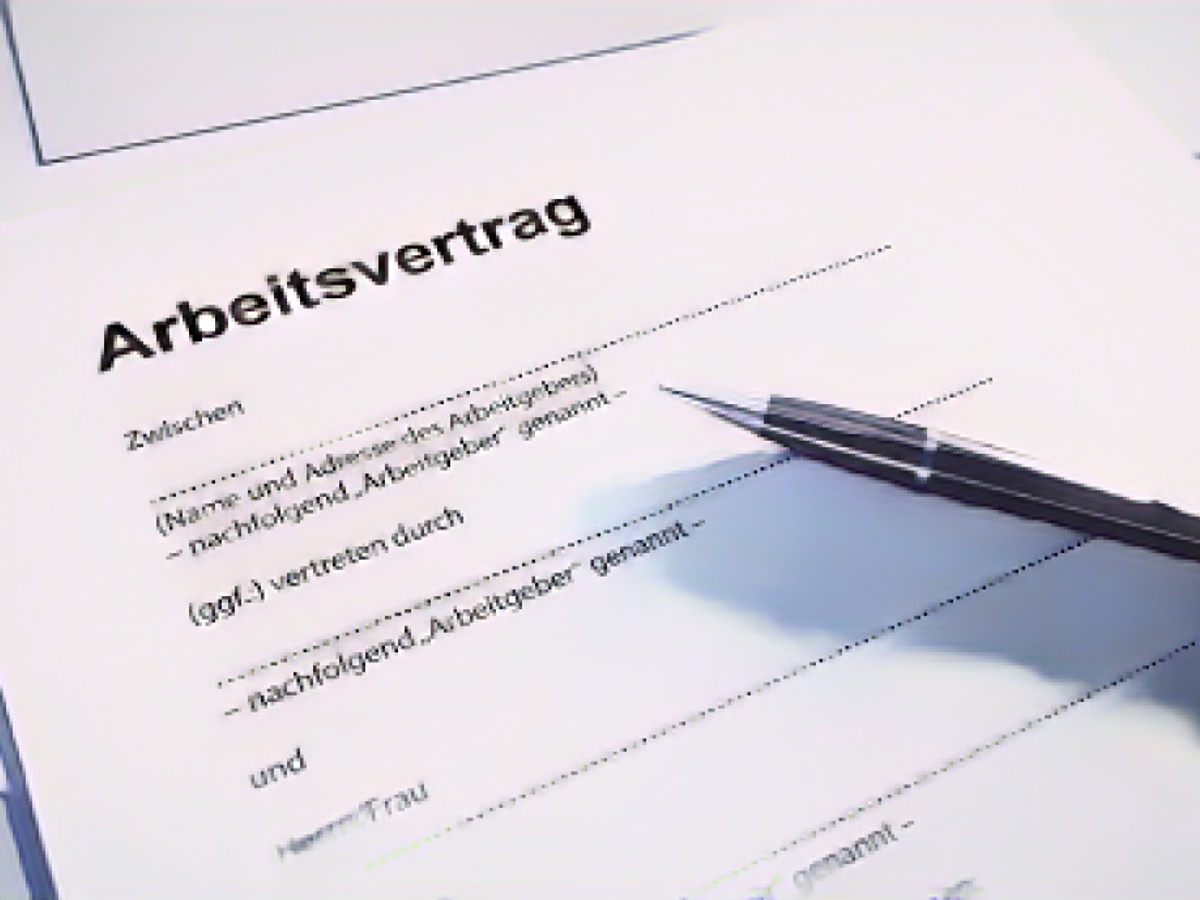Employment contract
Looking for a job can be very tedious. So it's all the more wonderful when you finally get a job offer from a company. Before you start your job, however, you should check your employment contract carefully.
What do I need to know?
What is the difference between a fixed-term and a permanent employment contract?
With a fixed-term employment contract, it is clear from the outset when your employment relationship will end. As soon as this date is reached, your employment relationship ends automatically. There is therefore no notice of termination. There is no end date for an open-ended employment contract. An open-ended employment contract must therefore be actively terminated by you or your employer.
Please note: If you are not sure whether you will find a new job after the end of your fixed-term employment contract, you must register with the employment agency as a jobseeker at least three months before the end of your contract. Otherwise you risk having your unemployment benefit reduced.
Do I have the right to a written employment contract?
Whether you are entitled to a written employment contract depends on the type of employment contract you have.
- In the case of fixed-term employment contracts, you must receive a written employment contract before you start work. If you do not receive your employment contract until later or not at all, the fixed-term contract is not valid and you are entitled to a permanent employment contract.
- A written employment contract is not mandatory for open-ended contracts. In this case, an employment contract can initially only be concluded verbally. In this case, however, your employer must provide you with written proof of your working conditions no later than one month after you start work. This proof should list the following facts: the start and duration of your employment relationship, a brief description of your activities, the amount of your salary, the number of hours you work per week, the notice period, etc.
Please note: Make sure you ask your employer for an employment contract or proof of your working conditions. Otherwise you will not be legally protected if there are problems with your employer.
What is a collective agreement?
Collective agreements are agreements between employers or employers' associations and trade unions. Trade unions represent the interests of employees. Collective agreements regulate the working conditions (i.e. working hours, wages, etc.) of employees in a company or industry, such as the metal and electrical industry or the chemical industry. As a rule, the working conditions laid down in a collective agreement are better than in similar companies or industries without a collective agreement. You can find out more about trade unions in our chapter "Works councils and trade unions".
What is the minimum wage I have to earn?
In Germany, employees of legal age and many interns are entitled to the statutory minimum wage. The statutory minimum wage is adjusted every year. Since October 1, 2022, the statutory minimum wage has been 12.00 euros gross per hour. Employees are not allowed to earn less.
Please note: The statutory minimum wage does not apply to the following groups
- Interns completing a compulsory internship for school or university.
- Interns who are completing an orientation internship for training or their studies if the internship lasts less than three months.
- People who are completing a measure offered by the employment agency or job center (e.g. entry qualification).
- Employees who have been unemployed for more than a year and have been back in work for less than six months.
- Volunteers.
There has also been a minimum wage for trainees since 2020. Apprentices in their first year of training are currently (as of 2022) not allowed to earn less than 585 euros per month. In the second and third year of apprenticeship, the minimum wage increases accordingly.
How long can I work per day?
In principle, you are not allowed to work more than 8 hours a day. You may work up to 10 hours a day for a short period of time. However, the additional hours must then be compensated by additional time off within six months.
Please note: If you work more than 6 hours, you must take a 30-minute break. This break is compulsory. However, it does not count as working time.
Am I entitled to a break?
If you work more than 6 hours, you are entitled to a 30-minute break. If you work more than 9 hours, you are entitled to a 45-minute break. If you are still a minor, you are entitled to a 30-minute break after more than 4.5 hours and a 60-minute break after more than 6 hours. The break time is generally not paid.
Short interruptions to work lasting no longer than 5 minutes do not count as a break and are paid. For example, you can go to the toilet or take a short rest - without this being deducted from your working time. Smoking breaks, however, are not included in these short breaks. This means that the time lost due to the smoking break must be made up. Your employer can also prohibit you from taking a smoking break completely.
You also have the right to a recovery break between two working days. For this reason, there must be at least 10 to 11 hours between two working days. This time is intended for your recovery.
Do I have to work overtime?
Overtime is additional working hours. So if you work more than is contractually agreed, you are working overtime.
Whether you have to work overtime depends on the provisions in your employment contract or collective agreement. If there is a regulation on the subject of overtime, you must comply with this regulation. If there is no regulation, you can generally refuse to work overtime. In exceptional cases, i.e. disasters and emergencies (e.g. flooding in the company) or special operational requirements (e.g. if an order that is very important for the survival of the company has to be completed at short notice), all employees must work overtime. Regardless of your employment contract or collective agreement.
Whether the overtime is compensated by additional money or additional time off is usually regulated in the employment contract. However, if your employment contract states that you will not be paid for overtime worked with either money or time off, the overtime must not account for more than 10% of the contractually agreed working hours. If there is no provision on this subject in your employment contract, you will generally receive your normal hourly rate of pay for overtime worked. However, the prerequisite for this is that your line manager has ordered the overtime and you have documented the overtime worked in writing. To do this, you must write down your overtime and have this document signed by your line manager.
Please note: Employees who receive a very high salary (as of 2022: from 6,750 euros gross in Eastern Germany and from 7,050 euros gross in Western Germany) are not paid extra for overtime.
Do I have to do all the tasks that my superiors ask me to do?
As a rule, you will find a list of your tasks in your employment contract. You are obliged to complete these tasks. Your line manager may also assign you other tasks. However, these additional tasks must meet the following requirements:
- They are legal and non-hazardous.
- They have something to do with your actual job.
- They correspond to your qualifications.
Do I have a right to vacation?
All employees are legally entitled to paid leave. If you work full-time, you can take at least 20 days' leave. If you work part-time or less, your vacation entitlement is reduced accordingly. In many employment contracts, however, vacation entitlement is regulated directly: If you have been promised more vacation in your employment contract, the regulation from your employment contract applies.
If you do not manage to take your vacation in the current year, you can take your remaining vacation into the next year. However, you must use up the remaining leave by March 31 of the following year at the latest. Otherwise it will be lost.
Please note: People with disabilities can take an additional 5 days' leave.
Where can I find help & support?
If you are unsure whether you should sign your employment contract or if you have problems with it, you can contact an advice center of the "Fair Integration" project. The staff speak different languages and will support you free of charge. You can find an advice center near you at faire-integration.de.
If you are discriminated against because of your origin, nationality, sexual orientation, gender or age, you can contact the Federal Anti-Discrimination Agency. The staff there can be contacted on Mondays from 1pm to 3pm and on Wednesdays and Fridays from 9am to 12pm by telephone on 030-18555 1855 or by email at [email protected]. They speak German, English and Arabic.
Please note: You can seek advice anonymously at all of these offices. Nobody will find out about your complaint if you do not want them to.
Important
Read your employment contract carefully before you sign it. If you are unsure, seek help from friends or an advice center. You can find an advice center near you at faire-integration.de.
- After reviewing the job offer, it's crucial to scrutinize your employment contract thoroughly before starting the job, as certain details such as the notice period and work conditions are outlined in this document.
- In cases of fixed-term employment contracts, it's essential to receive a written contract before commencing work, as the absence of a written agreement can render the contract invalid, entitling you to a permanent contract.
Source: handbookgermany.de








